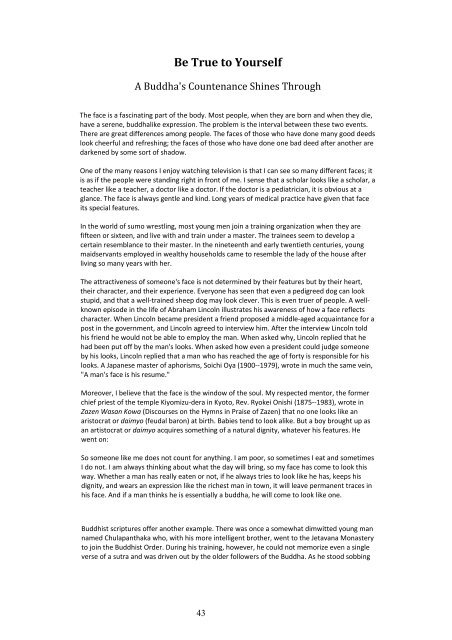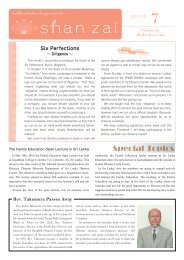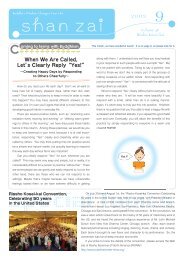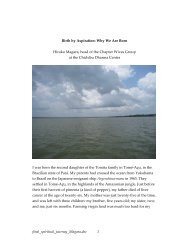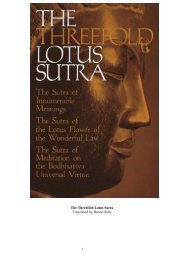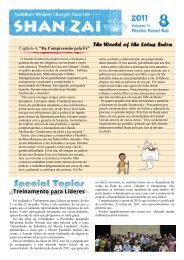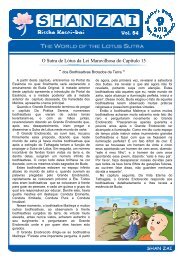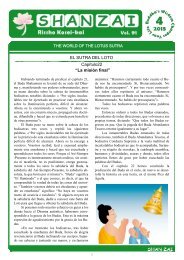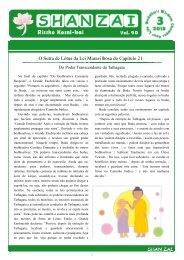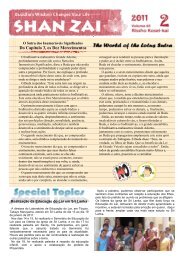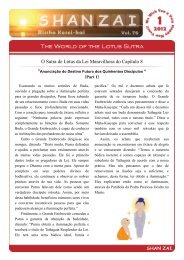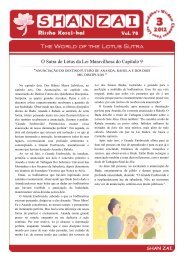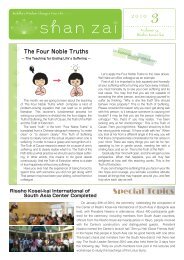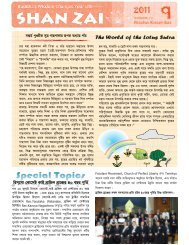You also want an ePaper? Increase the reach of your titles
YUMPU automatically turns print PDFs into web optimized ePapers that Google loves.
Be True <strong>to</strong> YourselfA Buddha's Countenance Shines ThroughThe face is a fascinating part of <strong>the</strong> body. Most people, when <strong>the</strong>y are born and when <strong>the</strong>y die,have a serene, buddhalike expression. The problem is <strong>the</strong> interval between <strong>the</strong>se two events.There are great differences among people. The faces of those who have done many good deedslook cheerful and refreshing; <strong>the</strong> faces of those who have done one bad deed after ano<strong>the</strong>r aredarkened by some sort of shadow.One of <strong>the</strong> many reasons I enjoy watching television is that I can see so many different faces; itis as if <strong>the</strong> people were standing right in front of me. I sense that a scholar looks like a scholar, ateacher like a teacher, a doc<strong>to</strong>r like a doc<strong>to</strong>r. If <strong>the</strong> doc<strong>to</strong>r is a pediatrician, it is obvious at aglance. The face is always gentle and kind. Long years of medical practice have given that faceits special features.In <strong>the</strong> world of sumo wrestling, most young men join a training organization when <strong>the</strong>y arefifteen or sixteen, and live with and train under a master. The trainees seem <strong>to</strong> develop acertain resemblance <strong>to</strong> <strong>the</strong>ir master. In <strong>the</strong> nineteenth and early twentieth centuries, youngmaidservants employed in wealthy households came <strong>to</strong> resemble <strong>the</strong> lady of <strong>the</strong> house afterliving so many years with her.The attractiveness of someone's face is not determined by <strong>the</strong>ir features but by <strong>the</strong>ir heart,<strong>the</strong>ir character, and <strong>the</strong>ir experience. Everyone has seen that even a pedigreed dog can lookstupid, and that a well‐trained sheep dog may look clever. This is even truer of people. A wellknownepisode in <strong>the</strong> life of Abraham Lincoln illustrates his awareness of how a face reflectscharacter. When Lincoln became president a friend proposed a middle‐aged acquaintance for apost in <strong>the</strong> government, and Lincoln agreed <strong>to</strong> interview him. After <strong>the</strong> interview Lincoln <strong>to</strong>ldhis friend he would not be able <strong>to</strong> employ <strong>the</strong> man. When asked why, Lincoln replied that hehad been put off by <strong>the</strong> man's looks. When asked how even a president could judge someoneby his looks, Lincoln replied that a man who has reached <strong>the</strong> age of forty is responsible for hislooks. A Japanese master of aphorisms, Soichi Oya (1900‐‐1979), wrote in much <strong>the</strong> same vein,"A man's face is his resume."Moreover, I believe that <strong>the</strong> face is <strong>the</strong> window of <strong>the</strong> soul. My respected men<strong>to</strong>r, <strong>the</strong> formerchief priest of <strong>the</strong> temple Kiyomizu‐dera in Kyo<strong>to</strong>, Rev. Ryokei Onishi (1875‐‐1983), wrote inZazen Wasan Kowa (Discourses on <strong>the</strong> Hymns in Praise of Zazen) that no one looks like anaris<strong>to</strong>crat or daimyo (feudal baron) at birth. Babies tend <strong>to</strong> look alike. But a boy brought up asan artis<strong>to</strong>crat or daimyo acquires something of a natural dignity, whatever his features. Hewent on:So someone like me does not count for anything. I am poor, so sometimes I eat and sometimesI do not. I am always thinking about what <strong>the</strong> day will bring, so my face has come <strong>to</strong> look thisway. Whe<strong>the</strong>r a man has really eaten or not, if he always tries <strong>to</strong> look like he has, keeps hisdignity, and wears an expression like <strong>the</strong> richest man in <strong>to</strong>wn, it will leave permanent traces inhis face. And if a man thinks he is essentially a buddha, he will come <strong>to</strong> look like one.Buddhist scriptures offer ano<strong>the</strong>r example. There was once a somewhat dimwitted young mannamed Chulapanthaka who, with his more intelligent bro<strong>the</strong>r, went <strong>to</strong> <strong>the</strong> Jetavana Monastery<strong>to</strong> join <strong>the</strong> Buddhist Order. During his training, however, he could not memorize even a singleverse of a sutra and was driven out by <strong>the</strong> older followers of <strong>the</strong> Buddha. As he s<strong>to</strong>od sobbing43


